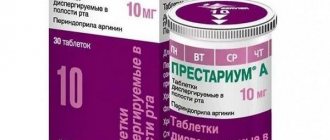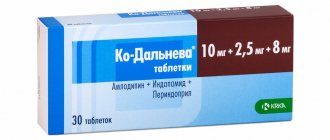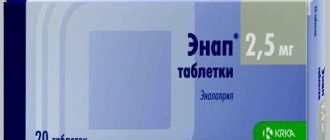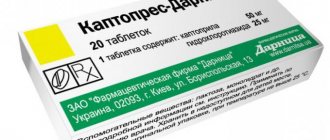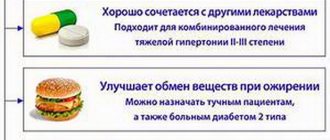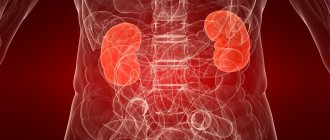Pharmacological properties of the drug Egilok
A selective β-adrenergic receptor blocker, has antianginal, antihypertensive and antiarrhythmic effects, reduces the automaticity of the sinus node, inhibits AV conduction, reduces the inotropic function of the myocardium and heart rate. The antihypertensive effect stabilizes at the end of the 2nd week of drug use. Reduces the number of angina attacks, reduces myocardial oxygen demand, and increases tolerance to physical activity. In case of myocardial infarction, it limits the ischemia zone of the heart muscle and prevents heart rhythm disturbances. The main advantage of Egilok Retard (extended-release tablets) is the prolonged release of metoprolol. The therapeutic effect is observed at a significantly lower concentration of metoprolol in the blood than when taking metoprolol in conventional tablet forms. Therefore, it is enough to prescribe 1 tablet per day of Egilok Retard to achieve a clinical effect. The drug is quickly and completely absorbed into the gastrointestinal tract (95% of the dose). The absorption of metoprolol in retard form is significantly prolonged, which determines a uniform concentration of the drug Egilok Retard in the blood plasma and a relative bioavailability of 80% compared to the schedule of changes in the drug content in the blood after administration of immediate-release metoprolol. The maximum concentration in the blood plasma is achieved 1.5 hours after oral administration and 2–6 hours after the drug in retard form. Plasma protein binding - 12%. The volume of distribution is 5.6 l/kg body weight. Metoprolol is metabolized in the liver; its metabolites do not show activity. About 5% of the dose is excreted unchanged in the urine.
Indications for use of the drug Egilok
- AH (arterial hypertension);
- IHD: stable or unstable angina (except Prinzmetal's angina);
- heart failure;
- heart rhythm disturbances (sinus, supraventricular tachycardia; ventricular extrasystole);
- arrhythmia due to mitral valve prolapse;
- secondary prevention after myocardial infarction;
- functional disorders of cardiac activity, accompanied by tachycardia;
- hyperthyroidism;
- prevention of migraine attacks.
Use of the drug Egilok
For hypertension (arterial hypertension), the initial dose of Egilok Retard is 50 mg/day in 1 dose. The daily dose can be gradually increased to 100–200 mg per dose. Egilok Retard can be used with other antihypertensive drugs to enhance the hypotensive effect. For the treatment of angina pectoris, the dose is 50 mg 1 time per day with further dose titration to the clinically optimal dose. If necessary, the dose can be increased to 100–200 mg per dose. Egilok Retard can be used with other antianginal drugs. For heart failure, the initial dose is 25 mg/day. If necessary, every 2 weeks the dose can be increased to 50 mg, after another 2 weeks - to 100 mg, if necessary, after 2 weeks to 200 mg. For arrhythmia, the initial dose is 50–200 mg/day in 1 dose. After myocardial infarction, for the purpose of secondary prevention, the dose is selected individually under the control of heart rate and blood pressure. For the prevention of migraine attacks, the usual dose is 100–200 mg/day in 1 dose. The tablets are taken once a day (in the morning), without chewing and with a sufficient amount of liquid. The drug can also be taken with food or on an empty stomach.
Compatibility with other drugs
Fluctuations in the results of Egilok's blood tests are observed when taken simultaneously with quinidine, terbinafine, paroxetine, and fluoxetine. It is incompatible with drugs that depress the nervous system, antiarrhythmic drugs and drugs used to treat angina with angioedema.
Correction is recommended when used simultaneously with the following drugs: adrenaline, beta-blockers, Hydrazaline, Diltiazem, Clonidine, Methyldopa, Rutherpine, Theophylline, estrogens, Ergotamine.
Therapeutic drugs that act on the nervous system, when used simultaneously, increase the possibility of a rapid decrease in blood pressure.
Side effects of the drug Egilok
Decreased heart rate, blood pressure. AV conduction disturbances, symptoms of heart failure, and depression are also possible. Side effects such as fatigue, headache, dizziness, and sleep disturbance may occur. In many cases, these phenomena are temporary and disappear on their own when the dose of the drug is reduced. Rarely, nonspecific skin reactions and coldness of the extremities, vomiting, diarrhea, constipation, bronchospasm, thrombocytopenia, and impaired liver function occur. If any other side effects occur that are not listed in the instructions, you must inform your doctor.
Does Egilok reduce blood pressure or not?
The instructions indicate that it can be used for hypertension. The therapeutic effect of all types of Egilok is to lower blood pressure and get rid of arrhythmias. Why does the drug lower blood pressure? The active ingredient of the drug affects the contractions of the heart muscle, reducing them, reducing the heart rate and the amount of blood passing through the aorta.
The main effect of Egilok is to reduce the load on the heart, which is achieved precisely by reducing pressure and heart rate.
Special instructions for the use of the drug Egilok
The drug should be used with caution in the treatment of patients with diabetes mellitus, with diseases of peripheral arteries, pheochromocytoma (it is possible to use the drug Egilok Retard only in combination with α-adrenergic receptor blockers), impaired renal and liver function. Before starting treatment, it is necessary to determine the function of the liver and kidneys. Treatment with Egilok Retard should be discontinued gradually. Sudden cessation of treatment, especially in the presence of cardiovascular pathology, can lead to a worsening of the condition (withdrawal syndrome). The use of Egilok Retard may cause fatigue or slight dizziness. Therefore, during the treatment period, it is necessary to refrain from driving vehicles and engaging in potentially hazardous activities that require increased concentration and speed of psychomotor reactions. If a patient seeks medical help or needs surgical treatment, be sure to notify the doctor that the patient is taking the drug Egilok Retard. Prescribing Egilok Retard during pregnancy and breastfeeding is possible if the potential benefit to the mother outweighs the risk to the child.
Contraindications
Like any drug, Egilok has a number of contraindications:
- Low heart rate.
- End-stage heart failure.
- The extreme phase of left ventricular failure, accompanied by a sharp decrease in the contractility of the heart muscle.
- Pregnancy and lactation period.
- Intolerance or allergy to certain components of the drug.
- Low blood pressure.
- Angioneurotic angina.
If the patient has contraindications from the list, the drug should not be used. A doctor may authorize taking Egilok if there are contraindications, but only in extreme cases. In this case, the dose is reduced and the body is regularly monitored. If no negative reaction is observed, continue taking it.
Interactions of the drug Egilok
Caution is necessary when using the drug simultaneously with:
- verapamil and diltiazem - risk of hypotension, bradycardia, atrioventricular block, asystole;
- clonidine - clonidine should be stopped a few days after the end of metoprolol to avoid the development of withdrawal syndrome;
- narcotic drugs - the risk of developing a cardiodepressive effect;
- ergotamine - increases the vasoconstrictor effect);
- some drugs that affect the central nervous system: sleeping pills - bromazepam, lorazepam;
- tranquilizers - chlordiazepoxide, trimethacin, tofisopam;
- tri- and tetracyclic antidepressants - citalopram, moclobemide;
- neuroleptics - chlorpromazine, triflupromazine - and alcohol - risk of arterial hypotension, effect on the central nervous system;
- NSAIDs, such as indomethacin, may reduce the antihypertensive effect of metoprolol;
- estrogens, for example norethindrone, norgestrel - the antihypertensive effect of metoprolol is reduced;
- hypoglycemic oral agents, for example chlorpropamide, glibenclamide, tolbutamide and insulin - enhancing their hypoglycemic effect, masking the symptoms of hypoglycemia;
- curare-like muscle relaxants - increased neuromuscular blockade;
- H2 receptor antagonists, for example cimetidine - may increase the bioavailability of the drug);
- rifampicin, barbiturates, such as phenobarbital, secobarbital, pentobarbital - the antihypertensive effect of metoprolol may be reduced.
Particular caution is required when used with ganglion-blocking drugs and other β-adrenergic receptor blockers, sympathomimetics, and class I antiarrhythmic drugs.
Egilok®
When prescribing Egilok®, heart rate and blood pressure should be regularly monitored. The patient should be warned that if the heart rate is <50 beats/min, a doctor’s consultation is necessary.
In patients with diabetes mellitus, blood glucose levels should be regularly monitored and, if necessary, the dose of insulin or oral hypoglycemic drugs should be adjusted.
Prescribing Egilok to patients with chronic heart failure is possible only after reaching the compensation stage.
In patients taking Egilok®, the severity of hypersensitivity reactions may increase (against the background of a burdened allergic history) and there may be no effect from the administration of usual doses of epinephrine (adrenaline).
The use of Egilok may worsen the symptoms of peripheral circulatory disorders.
Egilok® should be discontinued gradually, gradually reducing its dose over 10 days. If treatment is abruptly stopped, withdrawal syndrome may occur (increased angina attacks, increased blood pressure). During drug withdrawal, patients with angina pectoris should be under close medical supervision.
For exertional angina, the selected dose of the drug should ensure the heart rate at rest within the range of 55-60 beats/min, and during exercise - no more than 110 beats/min.
Patients who use contact lenses should take into account that during treatment with beta-blockers, there may be a decrease in the production of tear fluid.
Metoprolol may mask some clinical manifestations of hyperthyroidism (tachycardia). Abrupt withdrawal in patients with thyrotoxicosis is contraindicated because it can increase symptoms.
In case of diabetes mellitus, taking Egilok can mask the symptoms of hypoglycemia (tachycardia, sweating, increased blood pressure).
When prescribing metoprolol to patients with bronchial asthma, simultaneous use of beta2-adrenergic agonists is necessary.
In patients with pheochromocytoma, Egilok® should be used in combination with alpha-blockers.
Before performing any surgical intervention, it is necessary to inform the anesthesiologist about the therapy being carried out with Egilok (choosing a drug for general anesthesia with minimal negative inotropic effect); discontinuation of the drug is not required.
When prescribing the drug to elderly patients, liver function should be regularly monitored. Correction of the dosage regimen is required only if increasing bradycardia, a pronounced decrease in blood pressure, AV blockade, bronchospasm, ventricular arrhythmias, and severe liver dysfunction appear in elderly patients. Sometimes it is necessary to stop treatment.
Special monitoring should be carried out in patients with a history of depressive disorders. If depression develops, Egilok® should be discontinued.
When using Egilok with clonidine simultaneously, if Egilok is discontinued, clonidine should be discontinued after a few days (due to the risk of withdrawal syndrome).
Drugs that reduce catecholamine levels (for example, reserpine) may enhance the effect of beta-blockers, so patients taking such combinations of drugs should be under constant medical supervision to detect an excessive decrease in blood pressure or bradycardia.
Use in pediatrics
Efficacy and safety of Egilok in children and adolescents under 18 years of age
not defined.
Impact on the ability to drive vehicles and operate machinery
In patients whose activities require increased attention, the question of prescribing the drug on an outpatient basis should be decided only after assessing the patient’s individual response.
Overdose of the drug Egilok, symptoms and treatment
Symptoms: arterial hypotension, sinus bradycardia, AV block, heart failure, cardiogenic shock, asystole, nausea, vomiting, cyanosis, bronchospasm, loss of consciousness, coma. Treatment: gastric lavage, activated charcoal, for severe hypotension - β-adrenergic receptor agonists (norepinephrine) or intravenous atropine (for bradycardia). If there is no effect, dopamine or dobutamine should be prescribed. Glucagon (1–10 mg) may be effective. In severe cases, implantation of an artificial pacemaker may be necessary. Bronchospasm is eliminated by intravenous administration of β2-adrenergic agonists. Metoprolol is practically not excreted from the body by hemodialysis.
Side effects
You may feel tired when you first start taking this medicine. With further use, the following negative phenomena may occur:
- Chest pain, arrhythmia, swelling of the extremities, cardiogenic shock, decreased heart rate, a sharp drop in blood pressure when increased, fainting, cold feet.
- Headache, fatigue, depression, loss of attention, agitation, seizures.
- Nausea, abdominal pain, dry mouth, intestinal motility disorders, liver disease, jaundice, hepatitis.
- Shortness of breath, rash, skin flushing, increased sweating, blurred vision, dry whites of the eyes, inflammatory processes on the mucous membrane of the eyeball.
During pregnancy and lactation
"Egilok" is not recommended for pregnant women and during breastfeeding. Although, admission is possible if the positive effect on the mother outweighs the hypothetical harm to the fetus. If taking the drug is justified, it is necessary to promptly monitor the condition of the mother and fetus.
During breastfeeding, the use of the drug is also not recommended, which is associated with partial excretion of the active substance in milk. This leads to a pathology in the newborn such as bradycardia.

